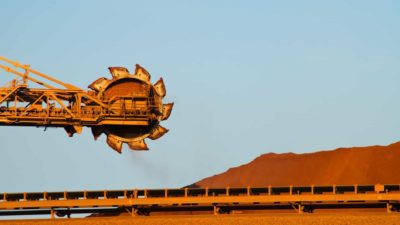After two years of strict border controls to stop the spread of COVID-19 in Western Australia, the virus has found its way to the Pilbara region. But what might this mean for ASX 200 mining shares?
Australia initially took a cautious approach when the virus first reared its head in March 2020, closing its international borders. This led to the state and territories also shutting down travel within the country.
Fast forward to today, most of Australia has re-opened for tourism and business, except WA.
While WA Premier Mark McGowan made executive decisions to safeguard the public, he has also sought to protect the iron ore industry. But now COVID-19 has emerged in the remote mining region of Pilbara.
Last month, ASX 200 mining giant BHP Group Ltd (ASX: BHP) was forced to take measures after five of its staff contracted the disease. The workers self-isolated in their accommodation along with close contacts, Their quarantine was meant to be for 14 days. However, earlier this week the WA government shortened the isolation period to seven days and they were released.
Major ASX 200 mining shares such as Rio Tinto are already facing a tight labour market in the state. An increase in cases across WA — it recorded 37 new cases yesterday, its biggest number so far — means those challenges are unlikely to ease anytime soon.
How important is the iron ore industry?
Iron ore mining is a lucrative industry for the state, and the government will be keen to protect it. Iron ore miners based in WA brought in $155 billion to the state over the 2020-21 financial year. These included mining giants BHP, Rio Tinto Limited (ASX: RIO), and Fortescue Metals Group Limited (ASX: FMG), along with the other smaller players.
WA views the iron ore industry as critical in regards to filling up its coffers. Last financial year, the state took home $9.8 billion in royalty payments, which reflected a 26% increase year-on-year.
Given the size of the revenue source, Premier McGowan has mandated all mineworkers be triple vaccinated. Additionally, mining companies have enforced a rapid antigen test for anyone arriving on site.
What could a COVID-19 breakout mean for ASX 200 mining shares?
Mining companies have been pushing for the WA border to reopen to allow more workers into the state border. However, any border re-opening without stringent rules could potentially jeopardise a company's workforce, adding to the labour squeeze.
This could affect ASX 200 mining shares. Bell Potter Securities' Giuliano Sala Tenna said (quoted by the ABC).
Labour costs will rise and they won't be able to get jobs done. There will be lots of dislocations within the projects, so we're concerned that we're going to see some weak quarterlies, which could see some knee-jerk reactions to some of the share prices [for] those miners.
When COVID-19 spread through another major iron ore producer, Brazil, it brought the industry to its knees.
However, Pilbara Ports Authority CEO Roger Johnston is more optimistic. He said (quoted by the ABC):
"We are uniquely lucky in Western Australia. We're not dealing with one miner with one big mine, and then you shut it down. We have multiples of miners, many of them are very large and most of them have a suite of mines. When you spread your risk like that you've not vested everything in one mine.
I wouldn't believe that you're going to see, if there was an impact, mines shut down for months and months at a time as you've seen in Brazil.
While the existing labour shortage is an issue for ASX 200 mining shares in WA, a widespread outbreak of COVID-19 could exacerbate the problem. This could have an impact on production levels which in turn would mean less revenue for the state.
Multiple shutdowns across the Pilbara regions are something Western Australia is doing everything it can to avoid.









